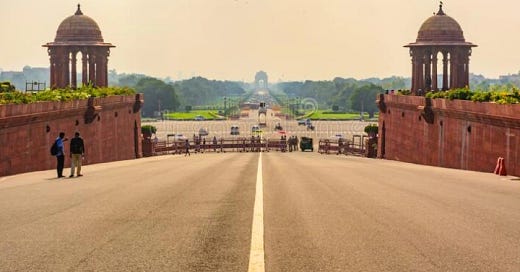The Politics-Policy Disconnect in India
The excessive centralisation of power in party platforms and the head of the government has hijacked public interest, leaving no room to construct a majority on any issue outside of party lines.
Published in the Indian Express
There’s a breakdown between politics and policy in India. Decision-making on virtually all governance issues is disconnected from politics and the mobilisation of public opinion. The repeal of the farm laws is thus a notable instance of politics and policy coming together, although in conflict. What is striking, however, is that the politics came from farmers’ groups, not political parties. The manner in which the government rammed through the three bills, tried to bully and delegitimise the protests and then repealed the laws shows that not only did the government not attempt to build consensus in favour of the bills, but that the channels of feedback from the ground were themselves not functioning properly. The Opposition was supportive of the protests but, with some notable local exceptions, had little role to play in the actual mobilisation of public opinion on the ground. The Opposition speaking in one voice in the Parliament helped, but the heavy lifting of organising in the villages and sustaining the protests was done by the farmers’ groups.
This disconnect between politics and policy is not a recent development, though it manifests differently across political divides. The liberal side has a policy-first lens but is unable to articulate its ideas in a manner which makes for good politics, repeatedly couching its ideas in a bureaucratic framework disconnected from political organisation. The impetus for a bureaucracy-first policy framework stems from the desire to remove local political discretion, which is assumed to be anti-people; the result, however, is to increase the distance between the policy initiative and the political organisation and thus the conduit for outreach and communication with the public. Moreover, bureaucracy is downstream from politics and this approach rather than curbing the state may have instead contributed to undermining the democratic process of political accountability since the political class is, by design, not central to the policy in the first place.
The right, on its side, has a politics-first lens but it derives its politics largely from its social agenda instead of issues of governance. In India, the right has a conception of a Hindu India but it lacks conceptual clarity and a governance agenda for the state. The policy imperatives, if any, are ad hoc and appear to be driven by the demands of running the political apparatus instead of a clear governance agenda. Instead, the right mobilises public opinion around cultural and community issues where the expectation from the state is not necessarily governance but patronage and protection for preferred social groups. Despite these differences, what is common across parties is the apolitical harnessing of the state as a disburser of different kinds of economic largesse, especially just before elections, as political parties cast about for simple ideas for easy mass communication.
There are many reasons for this wholesale breakdown of our political process. Indian politics and the state are weakly institutionalised to begin with, which leads to an all-around fuzziness in the relationship between politics and policy. However, this is as much an effect as it is cause, with the direction of change towards greater deinstitutionalisation instead of the opposite. Another contributing factor is that traditional sites of consensus-building such as media, civil society, and political parties have developed pathologies which have rendered sustained consensus-building almost impossible. Consequently, even on issues at the centre of public imagination, we are unable to coalesce around a way forward for constructive action.
One reason is of particular interest because it raises the bar to use democratic representation to mainstream new ideas to an impossible height: The excessive centralisation of power in party platforms and the head of the government (state and national). This renders the individual elected representative extraneous to governance even in their own constituency, where their raison d’etre is to provide representation and oversight. This causality requires its own larger argument but there are two incontrovertible consequences of this centralisation. First, elections can be used to change regimes but not to extract political accountability since there is no clear channel for “representation”; and the consolidation of partisanship, which has hijacked public interest, leaving no room to construct a majority on any issue outside of party lines. An added consequence of this congealed partisanship is that party supporters too lack leverage over their party to initiate new ideas or deliberation.
There’s too much at stake to allow such a state of affairs to continue. We have the largest youth population in the world, yet in many ways, the political process in our country is especially ill-equipped to respond to the challenge of giving our young a positive sense of purpose or engagement. It is important to rescue public interest from partisanship and cut through at least some of the bad-faith crosstalk across partisan divides. There are many issues which lend themselves to cross-cutting collaboration outside of ideological affiliations. Institutional reforms are required to create such a space but public-spirited individuals across political divides can lay the foundation for such collaboration through issue-based discipline, moderation and intellectual independence.
Also Read: What the Prashant Kishor Model Means for Democracy in India




Ruchi Ji, Very insightful; this Policy & Politics disconnect (And I will like to use this phrase ) . While working on the "Factory Resets for Our Democracy" over the last 6 years lead me to believe that a few inadequacy of our Constitution helped Madam Gandhi in severely curbing Election Funding in 1970' which in turn lead to Aaya Ram Gaya Ram syndrome. And the Anti-defection laws of 1985 completed the disconnect between Policy and Politics.
I would share relevant excerpts if you confirm on dhallvinod AT gmail DOT com